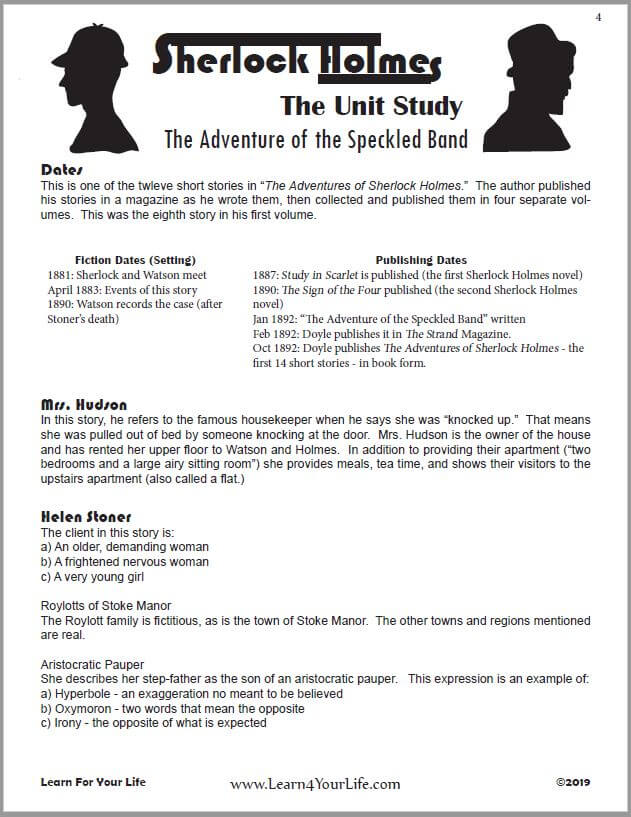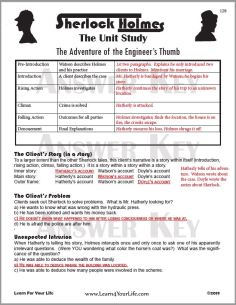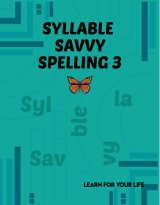Adventure of the Dying Detective Analysis
#H-43 DYIN
A cruel joke or a clever plot? In The Adventure of the Dying Detective analysis we see that the dextrous detective has a bent towards the deceptive.

In this series we look at some of the unique features of each Sherlock Holmes short story. We do not summarize the plot on this page, assuming that each reader has already read the actual story.
Dating of the Story
- Setting of the story: Debate on the timing of these events - see below
- Date recorded by Watson: not specified but according to Watson's last sentence in His Last Bow preface this is one of the stories "which have lain long in my portfolio".
- First published by Doyle in The Strand: November 1913
- Published in Book Form: 1917 His Last Bow - the fourth collection of short stories
Dates and Marriages
In the second paragraph of the story, Watson stated this occurred in the "second year of my married life." Great information for dating the story - except...which marriage? He married Mary Morstan in 1888 (making this story in 1890) and also a second wife in 1902 (making this 1904). Different Sherlock chronologists may debate this issue with passion, but I think we will look for other interesting nuggets of literary wisdom found in this narrative.Story Opening: Power Statement
Doyle begins this tale with one of his best power statements which are one of the three types of openings in his short stories. Whether you might be an enduring fan of the great detective or a first timer to the Sherlock stories, you are immediately drawn into the narrative with this first announcement:Mrs. Hudson, the landlady of Sherlock Holmes, was a long-suffering woman.Like other power statement openings, this is an attention-raising testimony that ties perfectly into the plot.
Besides opening our story, these very first words are also part of the pre-introductory pronouncement.
Pre-Introductory Pronouncement and FulFillment
In addition to opening our story, poor Mrs. Hudson's patience also directs us to the pre-introductory pronouncement and fulfillment: a concept introduced in the stories before the case opens.Pronouncement
The first paragraph states Sherlock Holmes was the very worst tenant in London.The astute reader will also make this connection: he was also the worst friend in all of London.
Watson, the oft-insulted biographer, suffers the most flagrant insult of their decades-long friendship when Holmes painfully insults him as a doctor. This pronouncement differs from those in other stories in several ways, including the fact that it occurs a little further in the story.
- Holmes: If I am to have a doctor whether I will or not, let me at least have someone in whom I have confidence.
- Watson: Then you have none in me?
- Holmes: In your friendship, certainly. But facts are facts, Watson, and, after all, you are only a general practitioner with very limited experience and mediocre qualifications. It is painful to have to say these things, but you leave me no choice.
- Comment: After all these years of insults, this was the worse. And Holmes DID have a choice. He set the whole thing up himself. Of course Watson was bitterly hurt. The only consulation to him is the Fulfillment (line below).
Fulfillment
It turns out Holmes did, indeed, respect Watson's professional opinion.Do you imagine that I have no respect for your medical talents? Could I fancy that your astute judgement would pass a dying man who, however weak, had no rise of pulse or temperature?
Tone vs Mood
This is one of the stories where Doyle brilliantly contrasts the tone (words used by author to communicate a specific feeling) and mood (feelings experienced by the character and/or the reader.)Usually mood and tone are synchronous. It's actually hard to make them contrast. This is one instance when they are different:
Watson grimaces. The reader grins.
Watson's mood is grim; his friend is dying and he verges on despair. Meanwhile, the under tone is comic. The reader picks up on the author's clues that the anguished Watson misses:- the bossy sick man
- a weakling springing up to lock the door and keep the key from his healthy companion
- the delirious mind that gives concrete instructions
- the glee of the inspector on the street
- Holmes' violent display of agony when Watson touches the ivory box
- his glib request for tobacco and a match.
Mrs. Hudson Speaks!!!!
One of the most famed characters of the canon, Mrs. Hudson rarely gets a word in edgewise. In movies she speaks but Doyle himself left her almost mute. But here, in this story, she not only dominates the opening line but has several speaking lines herself. And we learn a little more about their relationship.- She was paid well: his payments were princely. (Stinginess was not one of Holmes' faults.)
- The landlady stood in the deepest awe of him and never dared to interfere with him, however outrageous his proceedings might seem.
- She was fond of him too.
- She wept and trembled as she thought Holmes was dying.
Watson's Role in The Dying Detective
A look at Watson's roles in a story is always telling. In this story our dear Watson gets a new assignment: that of go-fer (which Holmes calls the best of messengers.) In addition, other roles are highlighted.- The deferential partner - I have so deep a respect for the extraordinary qualities of Holmes that I have always deferred to his wishes, even when I least understood them.
- The medical man
- But now all my professional instincts were aroused. Let him be my master elsewhere. I at least was his in a sick room. (That's what you think, Buddy. Not even on his sick bed are you going to be in charge.)
- Holmes, you are not yourself. A sick man is but a child and so I will treat you. Whether you like it or not, I will examine your symptoms and treat you for them. (Boo to Doctor Watson AND Doctor Doyle for this patronizing attitude of the Medical Doctor. But it was 1913.)
- Depth of Friendship revealed. Shortly after bitterly insulting Watson, Holmes' true feelings were accidently revealed when he saw Watson reaching for the plague-infected box:
It was a dreadful cry that he gave - a yell which might have been heard down that street.
- Trustworthy Companion - At least Watson was praised for his honest faithfulness.
- Don't forget. You won't fail me. You never did.
- You will realize that among your many talents dissimulation finds no place.
- Modern Translation - "I can't trust you to lie for me. Therefore I will pretend I am dying now. The same reason I let you grieve for three years when I faked my own death."
- The Witness - This is the second time Sherlock specifically wants Watson as a trial witness. (First was The Crooked Man)
A Closer Look At Holmes

Eccentric Tenant
...showed an eccentricity and irregularity in his life which must have tried (Mrs. Hudson's patience. No news for Sherlock fans here.- incredible untidiness
- addiction to music at strange hours (the boom box had not even been invented)
- his occasional revolver practice within doors
- atmosphere of violence and danger which hung about him
Always In Control
You know how masterful he is.He is referred to as master or masterful no less than five times in this tale.
Regular Self Contrasted with the Sick Patient
A few other descriptions Watson makes of his friend brilliantly contrast the character we have come to know with the sick man before us.- but with something of his old carelessness of manner. (Something I call glib or flippant. Second nature to him, really.)
- far removed from his usual suavity
- a noble mind
- he still retained, however, the jaunty gallantry of his speech
One Cautious Action
For the first time we learn Holmes carefully checks all packages delivered to him because "my correspondence is a varied one." (Hate mail and death threats weren't yet phrases in the vernacular but are here implied.)Sherlock and Women
Readers always have fun analyzing Holmes' relationship with women (or lack thereof.) Watson pens a few eye-brow raising statements here:...he had a remarkable gentleness and courtesy in his dealings with women. He disliked and distrusted the sex, but he was always a chivalrous opponent.The Adventure of the Dying Detective is one of the few Sherlock tales that does NOT have romance at the heart of it. This alone makes the statement above, as well as Doyle's decision to give Mrs. Hudson a more prominent role even more fascinating.
Ending of the Story
In this series we have been tracking the typical ending of Sherlock Holmes short stories and noted that Holmes frequently ends on a flippant note. And so it is here. The hero rose from his death bed to be as cheeky as usual. "I think something nutritious at Simpson's would not be out of place."Critical Assessment of the Story
In my opinion, The Adventure of the Dying Detective is the least convincing account in the entire 60 story canon. His insult to Watson's professional ability was incredibly cruel and pre-meditated in order to get him to fetch the offender. He could just as easily have sent Mrs. Hudson rather than go on with such a hurtful charade. Or one of the inspectors waiting on the street could have been the go-fer.Holmes' insults were intended to keep Watson four feet from his bed (which wouldn't really happen) and to get an M.D. to call a non-medically trained practitioner to treat him (also wouldn't happen.)
Let's also look at Holme's excuse for deceiving his valued friend: Watson was not good at "dissimulation" or deception. A fault Sherlock, obviously, did not share for this entire story is all about Sherlock's deception.
The plot might have benefited from a little fine tuning. Sherlock's plan might have been for Mrs. Hudson to call on Culverton Smith and be forced to modify plans when Watson unexpectedly arrived on the scene. It would have been less cruel and more believable and still allowed the trusty biographer to captivate his readers.
Strong Points
In spite of the critique above, this story has some positive points to bring to the canon.Unique Plot
This is the only time Sherlock fakes an illness and the only microscopic crime. Strong points for originality. It really takes some imagination to come up with 60 different crimes and counter-plots.Mood and Tone Contrast
As noted above, this is not easy to achieve. It's artistic success is best recognized after reading it several times.Mrs. Hudson
Mrs. Hudson's inclusion in this narrative is welcome. It's about time the long-suffering woman got a few lines of her own.Other Features of Dying Detective
Singular Use of the Word Singular
It was used thrice in this story (usually used only one single time.) Doyle must have lost count.Sherlock the Writer
We have another article written by Sherlock Holmes mentioned in this story. We can all look forward to his article on malingering, or pretending an illness, of which Holmes is extremely guilty in this story. Writing from experience, I guess.Literary Allusions: Coals of Fire
Proverbs 25:22 says to "heap coals of fire" on your enemy's head by giving him food and drink. Culverton Smith pretended he was heaping coals of friendly-forgiveness by coming to see Holmes.
Baker Street Treasure Hunt
Sprinkled throughout the stories are unusual objects at 221b Baker Street. In this story we can add these items:
- pictures of celebrated criminals on the wall (really!)
- sugar tongs (how quaint. But it was a quaint age.)
- black and white ivory box with a sliding lid (THE object, in this plot)
The unit study below analyzes eight of the most popular Sherlock Holmes stories. The Adventure of the Dying Detective is not one of the eight in this unit study.
Buy Sherlock Holmes: The Unit Study


Student Guide AND Teacher's Answer Key Included
$2.99 Download - 183 pages
Eight of the most popular tales demonstrate how to investigate a detective story.
![]()
Sherlock Holmes Pages
A catalog of our pages on Sherlock Holmes.
About Our Site
Hands-On Learning
































